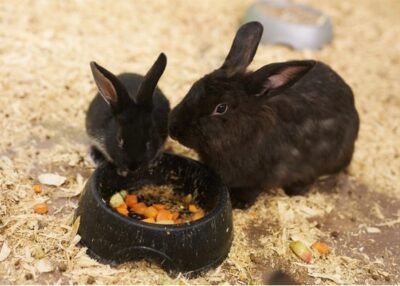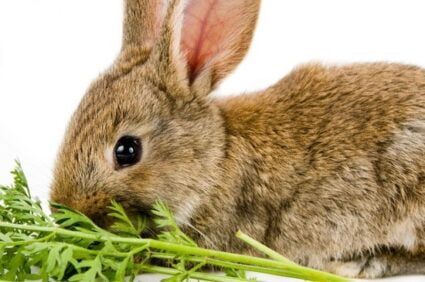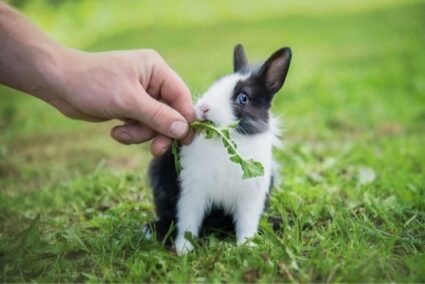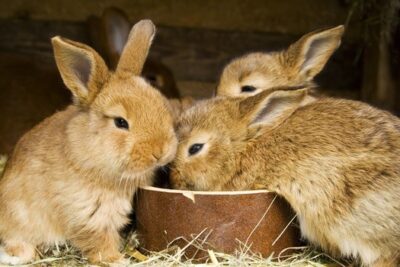The first six months of a rabbit’s life are pivotal to their long-term health. At this key stage of their development, a rabbit is constantly growing. Their diet needs to reflect this fact. Ensuring that your baby rabbit is sufficiently nourished will mean healthy bones and muscle mass into adulthood.
Hay and water are essential foods. Baby rabbits need more protein, so give them pellets and alfalfa hay. Your rabbit should be weaned. If not, use kitten or goat milk to imitate their mother’s milk.
Make sure that you get a baby rabbit into good eating habits. It’s tempting to overfeed young rabbits, but this can lead to obesity in later life. When their growth spurts subside, your rabbit needs less protein and more fiber. We will explain what the optimal diet plan for a baby rabbit is. You should also read our comprehensive guide to caring for baby rabbits.
What Do Baby Rabbits Eat and Drink?
New owners are sometimes surprised to learn what baby rabbits eat. Excessive carrots and iceberg lettuce can cause health issues. Instead, domesticated rabbits mainly sustain themselves on hay.
This replicates the experience of wild bunnies, which graze on grass all day. It would be impossible to provide a pet rabbit with enough grass to sustain itself. Hay is a substitute, and pet rabbits munch on it throughout the day.
In addition to hay, rabbits enjoy fresh fruit and vegetables and specialist pellets. The former must be offered sparingly. Too many vegetables can cause a stomach upset.
Pellets are also optional once a rabbit reaches adulthood. Pellets are critical for young and baby rabbits, as they provide a range of vitamins and nutrients. They’re also calorific. Pellets must be reduced in quantity as the rabbit gets older. Don’t panic if your rabbit has stopped eating pellets.
Hydration is also just as important to a rabbit. Bunnies must always have access to fresh water. You can provide this in a bowl, or a bottle that’s attached to their hutch.
What to Feed Pet Rabbits
The three core elements of a rabbit’s diet are pellets, hay, and fresh vegetables. If we were to draw a diagram of a bunny’s needs, hay would be at the base as the most critical.
This is because a rabbit’s digestive tract is engineered to process the fiber found in grass. There are several different types of hay available, each with slightly different qualities.
- Grass Hay (aka Meadow Hay or Timothy Hay). This is the most popular hay feed among rabbit owners. This hay is fresh grass that has been cut and dried out. This means that it replicates a wild rabbit’s diet.
- Oat Hay. This hay is made up of oat grass, which is harvested before blooming. Once the oat blooms, this hay no longer contains any nutritional value for a rabbit. It can be used as bedding, though.
- Alfalfa Hay. This is a little different; it’s a legume, rather than grass. Alfalfa hay is usually fed to larger animals. It contains more protein and calcium than other hays, so it leads to weight gain.
Pellets are considered to be an essential part of a rabbit’s diet. Many claim that pellets are unnecessary for adult rabbits though, and are just empty calories.
If your rabbit is looking overweight, pellets should be sacrificed. Adult rabbits can happily sustain themselves on hay alone. Pellets are essential for helping a young rabbit grow, though.

These should always be kept as a treat, especially fruit. Rabbits love sweet tastes, so they enjoy berries, raisins, parsnips, and carrots. Their bodies are not designed to process carbs, though.
A rabbit can enjoy a tablespoon of fresh fruit and vegetables for every 2 lbs. of their body weight.
Again, an overweight rabbit should not receive any fruit and veg for a while. Rabbits do not necessarily need these to flourish. They’ll get all the vitamins they need from hay.
Baby Rabbit Feeding Guide
Young bunnies need to eat more, as they are continually growing. Baby rabbits also use food to stay warm ahead of the first shedding of their fur. Here’s some info on when baby rabbits get fur.
The diet of baby rabbits adjusts steadily as they grow. They’ll start eating solid hay at around 2 weeks of age. This will be supplemented by milk from their mother, though. By the time they reach 4 weeks, baby rabbits eat pellets and hay.
Feed alfalfa hay to a baby rabbit. The protein and calcium found within will help them grow strong muscles and bones. Also mix in some standard hay, though. This will make the transition easier when your rabbit reaches adulthood.
You should also ensure that you pick up pellets designed especially for young rabbits. These will provide everything that a growing bunny needs.
Whatever you decide to feed your baby rabbit, keep it consistent. Any bunny is sensitive to changes in diet, but young rabbits are especially so. Don’t chop and change unless it’s strictly necessary.
Baby Rabbit Food List
Before you even bring your rabbit home, you should pull together a shopping list. Healthy food for baby rabbits is pivotal, so don’t make any best guesses after their arrival.
You’ll need to buy hay in advance. Prioritize alfalfa hay, but get some traditional meadow hay too. Your bunny cannot eat alfalfa hay forever, so don’t let them get too attached to the taste.
You’ll also need pellets. Have a chat with a clerk in your local pet store, and get the ideal pellets for your bunny. There will be numerous options, tailored to different life stages.
Avoid the temptation to buy a huge bag of pellets. You may be told that baby rabbits can eat unlimited pellets. Pellets can grow moldy quite quickly. Smaller bags are preferred.
Pellets
It’s advisable to make pellets part of your baby rabbit’s meal plan. These will help your young bunny grow up happy and healthy. Both quality and quantity should be carefully managed, though.
Tread carefully around claims that baby rabbits can eat unlimited pellets. In theory, this is correct. The ever-growing body of a bunny will cope with the calories consumed while they’re so young.
All the same, this is teaching your bunny bad habits. They’ll grow accustomed to having a constant supply of pellets. If you remove this option as an adult, they’ll grow distressed. It’s better to teach a young rabbit to enjoy hay early.
Also, ensure that you pick up the highest quality pellets possible. They should make up at least 22% fiber. Protein should not amount to more than 14%. Avoid anything with more than 1% calcium, as this can be harmful.
Don’t be tempted by muesli-based pellets. These will be tastier, as they contain nuts and seeds. A baby rabbit will pick out the nutrient-deficient fun ingredients, and ignore the rest.
Hay
Alfalfa hay is ideal for baby rabbits. For the first months of their life, a rabbit will enjoy the protein in this hay. As pellets also contain alfalfa, your baby bunny will be in good health.
Even though alfalfa hay is good for baby rabbits, it shouldn’t be all they have. Aim for a ratio of around 60:40, mixing alfalfa with traditional grass hay. This will make the eventual transition to meadow hay only less jarring.
Another thing to remember is that your rabbit’s hutch will be filled with hay. They’ll sleep on it, and generally surround themselves with the substance. This also means that your rabbit will pee and poop in their hay.
As baby bunnies have immature brains and bladders, they take a while to be litter trained. This needs to be handled with care. Urine can turn hay moldy, and moldy hay is toxic to rabbits. Clean their hutch regularly.
It’s vital that your baby rabbit sees hay as a source of pleasure. Get them into the habit of grazing on hay as early as possible. Incorporate it into playtime, and exercise.
Fresh Fruit and Vegetables
In the past, popular opinion dictated that baby rabbits should not be fed fresh food. This is because young bunnies have particularly sensitive digestive tracts. The truth is, fresh fruit and vegetables are fine in moderation.
The misconception that fresh vegetables are dangerous to baby bunnies arose through a lack of education. Feeding a rabbit of any age-inappropriate vegetables will cause stomach upsets. A bunny needs time to adjust to dietary changes.
When bringing home a baby rabbit, learn what fresh food their mother enjoyed. Once the bunny reached 4 weeks of age, they would have nibbled on these vegetables too. Their stomachs will be able to cope with them in small doses.

Fresh vegetables will also help a young rabbit manage the size of their teeth. Rabbit teeth never stop growing. By crunching on tough, solid vegetables, they’ll be filed down.
Fruit is best avoided in baby rabbits, unless used as training treats. Offer small amounts of vegetable as a treat, once your bunny has eaten sufficient hay.
Should I Give a Baby Rabbit Meat?
Meat must be avoided. While baby bunnies need protein, they don’t need meat. They’ll suffer from an excess of protein, and experience stomach upsets as a result.
Your rabbit may develop a taste for meat. A little won’t kill them, but it will make them uncomfortable. A rabbit’s digestion is engineered to process fiber, not protein. The older they get, the more problematic this will become.
Rabbits are herbivores. They do not want or need to eat meat. Babies are no exception to this rule.
Can Baby Rabbits Drink Water?
Baby rabbits can drink water. It should be actively encouraged.
Rabbits will start to hydrate from their mother’s water source at around 3 weeks old. As baby bunnies eat more dry food, water becomes particularly important. They need to hydrate regularly to stay healthy.
It’s vital to learn how your baby rabbit enjoys drinking. Some bunnies find water bottles fun. Others would rather lap from a bowl. Encourage your pet to drink in whatever way they prefer.
If you use a bowl, ensure that it’s heavy and shallow. Baby rabbits are playful and curious. They will splash around in water if they can. This can turn their hay moldy, and wet rabbits suffer a drop in body temperature.
Can Baby Rabbits Drink Cow Milk?
Baby rabbits drink milk from their mother’s until they’re 8 weeks old. A bunny should never be separated from their mother before this. If you’re offered a rabbit younger than 8 weeks by a breeder, walk away.
If you must provide a rabbit with milk, don’t use cow milk. This is too dense in calcium. The closest equivalent is kitten milk. Warm goat milk will be suitable in a pinch.
Rabbit milk contains more calories than kitten milk, though. As a result, mix in a tablespoon of sugar-free heavy cream. Baby bunnies should be fed milk twice a day.
Also, don’t forget that baby rabbits are not sustained on milk alone. Once they reach 2 weeks, they also need water and solids. Failing to provide these will leave a rabbit malnourished.
How Can I Tell if My Baby Rabbit’s Diet is Healthy?
Young rabbits need to nap regularly, but they’ll be energetic in between. If your young rabbit is lethargic, it may be due to dietary deficiency.
Another way to check on a rabbit’s condition is their droppings. Rabbit poop is a fine way to assess your bunny’s digestive health. Rabbit’s produce two types of poop:
- Pellets, which will be littered throughout their cage.
- Cecotropes, which are bunches of fecal matter that the rabbit eats.
A healthy poop pellet will be light brown, and will crumble when picked up. If your rabbit’s feces pellets are dark, it suggests they’re eating too much protein.
Diarrhea in a baby rabbit is a medical emergency. This condition can be fatal in hours. Administer the first aid suggested by the University of Miami, and make an urgent vet appointment.
My Baby Rabbit Eats Too Fast
This is nothing to worry about. Even if it leads to hiccups, these will pass in a short period of time.
The main reason that baby rabbits eat quickly is food insecurity. Until they get into a strict routine, bunnies worry about when they’ll be fed. They’ll guzzle food in case they don’t receive any more.
Rabbits that share a hutch are particularly likely to eat fast. They’ll be worried that another, older bunny will eat their share otherwise.
Also, remember that baby rabbits are always growing. This means that they’ll be hungry pretty much constantly. Once they establish a routine, they’ll calm down.
My Baby Rabbit is Not Feeding
If your baby rabbit is refusing to eat, it’s essential to find out why. A rabbit not eating at any age is worrying. This goes double when the bunny is young.
A young rabbit eating less as they reach adulthood is not as concerning. As they grow older, rabbits need fewer calories. They may take to eating more hay than pellets. This is a good thing. Don’t let them eat too much alfalfa hay, though.
You should also check that your bunny is not just being stubborn. If you have changed their diet, they may be holding out for a favorite. This needs to be managed carefully.

Baby rabbits need to eat, but if you cave too quickly, you’re setting a dangerous precedent. They’ll refuse to eat anything that doesn’t like into adulthood.
Move the bowl around in the first instance. If a rabbit feels a draught, it will put them off eating. Food that’s too close to a preferred elimination spot will also deter a bunny from eating. Rabbit pee has an overpowering smell.
Also, ensure that your baby rabbit is not anxious. Being separated from their mother and siblings can be distressing. Offer plenty of TLC and a welcoming home environment to help your bunny settle.
Spaying or neutering young rabbits also leads to behavioral changes. Your bunny may temporarily lose their appetite. This should pass quickly. Observe them, and take action is necessary.
Alternative Food for Baby Rabbits
If your baby rabbit is refusing to eat, you’ll need to offer the formula. This is often easier said than done. Seek professional help to ensure your bunny is sufficiently nourished.
Use kitten or goat milk if you cannot source rabbit-specific milk. Zooh Corner recommends feeding milk at the following quantities, at least twice a day. If your rabbit will not eat hay or pellets, they’ll need more:
- 1 – 2 Weeks of Age – 10 – 15 cubic cm
- 2 – 3 Weeks of Age – 15 – 30 cubic cm
- 3 – 8 Weeks of Age – 30 cubic cm
You can pick up a syringe to provide this milk from a pet store. Many baby rabbits will not take to this, though. Bunny-savvy suppliers will stock a product called the Miracle Nipple. This imitates the nursing experience.
This is not a permanent solution, though. You must learn why your rabbit is not eating, and resolve the issue.
Feeding a baby rabbit is largely similar to nourishing an adult equivalent. Young bunnies eat more, and show more interest in pellets.
What’s most important is that you get your rabbit into good habits surrounding food. Like any animal, a rabbit’s formative experiences will play a significant role in their adult persona.
Help a rabbit eat appropriately while they’re young, and they’ll reach adulthood in a healthy condition. From there, you can enjoy a long and happy relationship.


my rabbit can not breastfeed his bannies after delivery what can i give because they usually die after 2 days
I have the same question as Lucy but I used infant milk to keep the baby rabbits alive unfortunately they all died